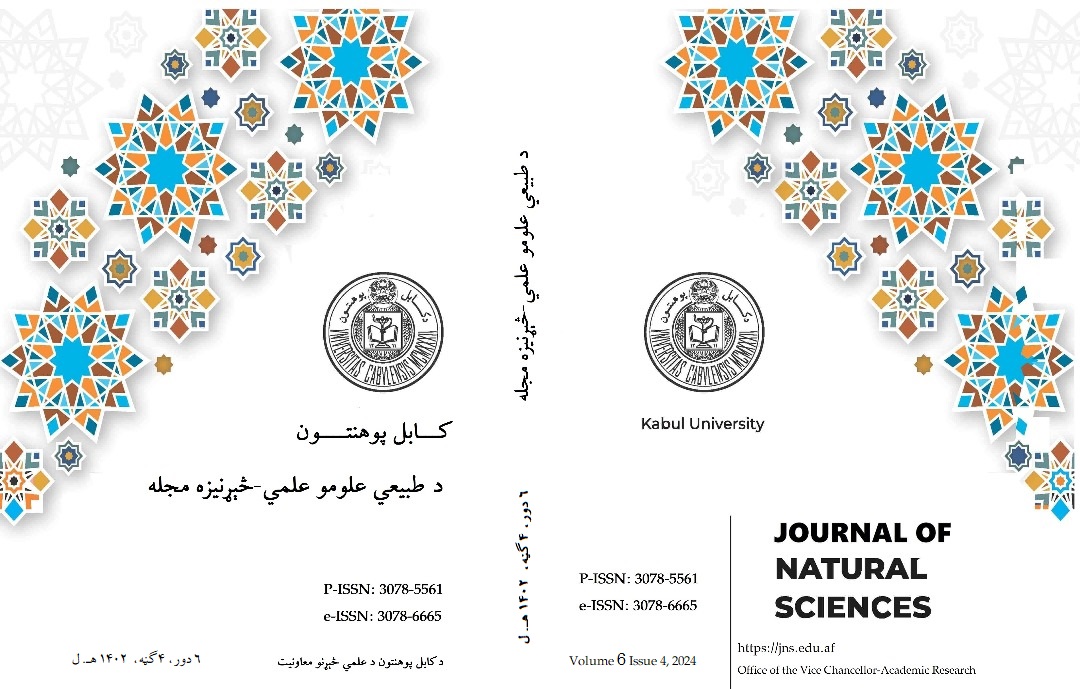Main Article Content
Abstract
The moment of inertia theorems, crucial for determining the moment of inertia of objects with diverse shapes, were assessed through experimental analysis using a physical oscillator in the Mechanics Laboratory at the Faculty of Physics. Results from this study demonstrate that the theorems of parallel axes and the additivity of moment of inertia can be accurately validated through the oscillator experiment. The physical oscillator emerges as a valuable tool in mechanics, physics, and engineering labs, facilitating precise determination of moment of inertia and acceleration due to Earth's gravity. Employing the physical oscillator method for experimental investigations of moment of inertia theorems necessitates adopting a unique perspective on experiences, yielding valuable results through comprehensive data analysis.
Keywords
Article Details
Copyright (c) 2024 Reserved for Kabul University

This work is licensed under a Creative Commons Attribution-NonCommercial 4.0 International License.
References
- Alhassid Y, Bertsch GF, Liu S. Nuclear moment of inertia and spin distribution of nuclear levels. Phys. Rev. C. 2005; 72(6).
- Townes CH, Schawlow LS. Microwave Spectroscopy: Courier Corporation; 2013.
- Bejger M, Haensel P. Moments of inertia for neutron and strange stars: Limits derived for the Crab pulsar. Astron. strophysics. 2002; 396(3): 917-921.
- Ran L, Bumby JR, Tavner PJ. Use of turbine inertia for power smoothing of wind turbines with a DFIG. in IEEE 11th International Conference on Harmonics and Quality of Power. 2004;: 106-111.
- Y. S. Narang VMAaAGW. The effects of prosthesis inertial properties on prosthetic knee Moment and hip energetics required to achieve able-bodied kinematics. IEEE Trans. Neural Syst. Rehabili. Eng.. 2016; 24(7): 754-763.
- Feder T, Vittek J, Sindler P. T. Fedor, J. Vittek, and P. Sindler, “ Influence of variable moment of inertia in robot servo motor control: IEEE ELEKTRO; 2014.
- Bacher M, Whiting E, Bickel B, Storkin O. Spin-it: Optimizing moment of inertia for spinnable objects. ACM Trans. Graph. 2014; 33(4).
- Cutnell JD, Johnson KW. Physics. 9th ed.: John Wiley & Sons, Inc.; 2012.
- Serway RA, Jewett,Jr. JW. PHYSICS for Scientists and Engineers with Modern Physics. 7th ed.: Brooks/cole THOMSON.
- Fowles GR, Cassiday GL. Analatical Mechanics: Thomson Learning / Brooks/Cole; 2004.
- ) Russeva GB, Tsutsumanova GG, Ressev SC. An experiment on a physical pendulum and Steiner’s theorem. PHYSICS EDUCATION. 2010; 45 (1).
- Richardson TH, Brittle SA. Physical pendulum experiments to enhance the understanding of moments of inertia and simple harmonic motion. PHYS ICS EDUCAT ION. 2012; 47(5): 537-544.
- Genta G, Delprete C. Some Considerations on the Expremintal Determanation of Moment of Inertia. Meccanica. 1994; 29(1): 125-141.
References
Alhassid Y, Bertsch GF, Liu S. Nuclear moment of inertia and spin distribution of nuclear levels. Phys. Rev. C. 2005; 72(6).
Townes CH, Schawlow LS. Microwave Spectroscopy: Courier Corporation; 2013.
Bejger M, Haensel P. Moments of inertia for neutron and strange stars: Limits derived for the Crab pulsar. Astron. strophysics. 2002; 396(3): 917-921.
Ran L, Bumby JR, Tavner PJ. Use of turbine inertia for power smoothing of wind turbines with a DFIG. in IEEE 11th International Conference on Harmonics and Quality of Power. 2004;: 106-111.
Y. S. Narang VMAaAGW. The effects of prosthesis inertial properties on prosthetic knee Moment and hip energetics required to achieve able-bodied kinematics. IEEE Trans. Neural Syst. Rehabili. Eng.. 2016; 24(7): 754-763.
Feder T, Vittek J, Sindler P. T. Fedor, J. Vittek, and P. Sindler, “ Influence of variable moment of inertia in robot servo motor control: IEEE ELEKTRO; 2014.
Bacher M, Whiting E, Bickel B, Storkin O. Spin-it: Optimizing moment of inertia for spinnable objects. ACM Trans. Graph. 2014; 33(4).
Cutnell JD, Johnson KW. Physics. 9th ed.: John Wiley & Sons, Inc.; 2012.
Serway RA, Jewett,Jr. JW. PHYSICS for Scientists and Engineers with Modern Physics. 7th ed.: Brooks/cole THOMSON.
Fowles GR, Cassiday GL. Analatical Mechanics: Thomson Learning / Brooks/Cole; 2004.
) Russeva GB, Tsutsumanova GG, Ressev SC. An experiment on a physical pendulum and Steiner’s theorem. PHYSICS EDUCATION. 2010; 45 (1).
Richardson TH, Brittle SA. Physical pendulum experiments to enhance the understanding of moments of inertia and simple harmonic motion. PHYS ICS EDUCAT ION. 2012; 47(5): 537-544.
Genta G, Delprete C. Some Considerations on the Expremintal Determanation of Moment of Inertia. Meccanica. 1994; 29(1): 125-141.
